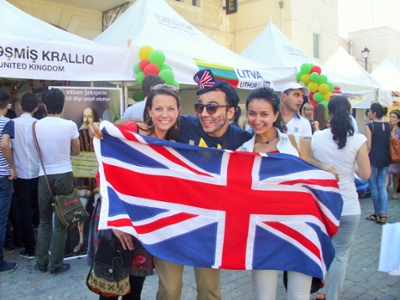Busy, busy busy!
What a busy week! Last Friday, I was given an environmental scoping statement project to work on concerning irrigation system rehabilitation in two villages, Khujbala and Sarisu. A scoping statement must be completed and approved for each project that Socio-Economic Development Activity (SEDA, the organization I work for) carries out. The process begins with a review of proposed projects from Community Development Councils (CDCs) in SEDA's focus regions. SEDA reviews these proposals and selects a few that are realistic and sustainable. Following selection, the environmental manager, along with engineers and other regional staff, peforms site visits and analyses the possible effects the project may have on the surrounding environment. Public meetings are held to hear concerns of the villagers, and the environmental manager and engineers address these issues. Engineer reports, construction plans, budgets, and other documents must be prepared. One of these documents is the scoping statement. A scoping statement contains analysis of relevant environmental legislation, international legislation, cultural landmarks, wildlife and vegetation, a history of the land and area, photos, graphs, engineering plans, potential issues (such as sewage and pollution created by construction crew, poaching by construction crew, disturbance of vegetation, etc.), suggestions for mitigation of environmental concerns, and many other details about the project. These statements can be quite long (often around 75 pages), and a lot of work goes into organizing them and including the relevant data. Once the final version is prepared, the document is sent to the United States Agency of International Development (USAID) for approval, which must occur before construction can begin. This week, I drafted the irrigation system rehabilitation scoping statement, and I edited an environmental report concerning the construction of medical points, creating the final version which was sent off for approval.
This morning, I attended a Building Local Capacity for Development (BLCD) training event given by the law expert at our partner office, the International Center for Not-for-Profit Law (ICNL) (Yes, there are a lot of acronyms in this line of work--can you keep up?). The training was based on the handbook created by ICNL and SEDA on the Law on Access to Information. The training was designed to increase understanding of what the law means and to make the required procedures accessible and easy to understand. There were two hypotheticals given at the end of the training, which gave examples where information would need to be requested from various agencies. The attendees were split into two groups; each group discussed and presented their ideas on what they would do, and the ICNL trainer made suggestions and asked questions. The trainees were representatives of NGOs throughout Azerbaijan that were given grants from BLCD (BLCD's program is similar to SEDA's program in that it gives grants to various NGOs to support development projects). The training and discussion were both in Azerbaijani, so SEDA's translator specialist attended the event with me. I will report on the training to SEDA's director, and I will help to plan and implement changes to the training for the SEDA training event held in Guba on June 24th. That event will be the same training information, but it will be to a different audience (CDC members) in a different location.
A European festival was held last Saturday in the Old City! There were tents for each European country, and each tent had books, magazines, photos, food, brochures, and other special items from the country. Some countries even had one of their volunteers dress up in traditional dress (or patriotic clothes, as you see in my picture below with the British volunteer). During the festival, there was a trivia event, and some traditional dance performances. Later that evening, there was a concert, where a singer from Holland, a cellist from Croatia, and a band from Estonia performed. It was a fantastic concert!
